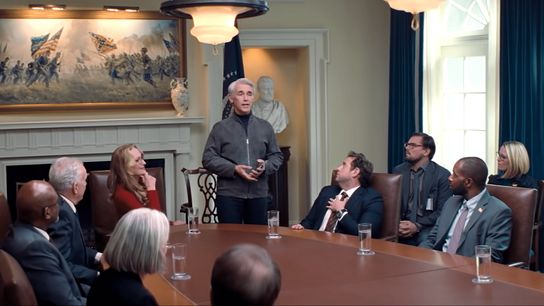As usual, I was late to the pop culture party, but after getting asked enough times what I thought of Don’t Look Up, I finally watched. Being a climate communicator working to make environmental issues less overwhelming and politicized, I spent much of the movie feeling weird seeing as Don’t Look Up does the exact opposite. But after a little reflection, I stopped viewing Don’t Look Up as a climate communicator and started viewing it as a satire writer. That’s when I realized its beauty: Don’t Look Up isn’t a representation of the climate crisis. It’s a cathartic, slightly irrational scream into the void for anyone frustrated with a lack of climate action.
I need to make a few points very clear off the bat. First, climate change is nothing like the threat of a five to ten kilometer comet hitting the Earth. The sequence of events that would have to occur for climate change to bring about the extinction of the human race is unknown and unfathomable. Climate change puts a lot at stake: the survival of millions, probably billions, of people in vulnerable areas (island nations, coastal communities, drought-stricken regions, etc.), the survival of nearly every city on Earth (seeing as most cities are on coasts and at risk due to sea level rise), the global supply of food, water, energy, land, and resources, the global economy, human health, justice, national security, etc. Climate change will alter life as we know it. If we take action, we can minimize those changes. But I can’t quite see a scenario based in science where climate change would cause the end of the human race on its own. Even in a worst case scenario, some people should manage to hole up and survive. I believe the stakes I just listed are plenty sufficient to take climate change seriously, but it is still nowhere near a comet nicknamed a “planet killer.”
 President Orlean (Meryl Streep) encourages constituents to ignore the incoming Earth-ending comet.
President Orlean (Meryl Streep) encourages constituents to ignore the incoming Earth-ending comet.Second, climate change is not two-sided in the way Don’t Look Up portrays the comet to be. Sure, there have been and still are people who have called climate change a hoax, though I see that sentiment expressed less and less these days. There are people contending climate change is natural and not due to human greenhouse gas emissions, which is also not backed by science. But within the very large group of people who understand that climate change is real and caused by human greenhouse gas emissions, there are varied sentiments on how important it is and how we should address it. The Democratic and Republican parties both have major differences in opinion in their parties about those two points, so opposing a particular climate policy doesn’t automatically mean denialism. We’re really not as far apart as it might feel on this issue. I’ve spoken to people across the political spectrum and have yet to meet anyone with whom I couldn’t find common ground pretty easily. The “alarmist” and “denialist” crowds (for lack of better term) are certainly the loudest, but I believe most people don’t fit into either crowd. I’m guessing most people haven’t thought much about climate change, honestly. I hope The Sweaty Penguin serves as an outlet for them to learn the facts behind climate change, explore the nuance, and not feel so overwhelmed. So when I see the “don’t look up” crowd and “just look up” crowd at odds in the movie, I can’t help but feel like that’s inaccurate. On climate change and every other issue, people have nuanced and often not fully-formed opinions.
Third, the idea of trying to solve an issue while boosting the economy was not analogous to climate change at all. In the movie, they literally abort a mission to destroy the comet as the rockets are mid-air because of a sudden discovery that the comet has minerals that could be obtained. The new mission was led by a singular cell phone company. And most strikingly to me, the plan was not peer-reviewed, and detractors were shunned. If a technological or market-based solution for climate change played out that way, I’d be as frustrated and angry as anyone. But plenty of possible climate solutions that are rooted in innovation or sustainable development have been or are being vetted, and they could genuinely help the environment and economy simultaneously. Carbon capture technologies, seawalls and jetties, nuclear energy, even wind and solar power are technologies that have their fair share of cons, but would create jobs and make people money while helping to address climate change. If you’re against any solution that exists under the framework of capitalism, that’s your prerogative, but these types of solutions are absolutely nothing like the idea of letting a comet hit Earth in smaller pieces and giving all the minerals to one cell phone CEO.
 Tech CEO Peter Isherwell (Mark Rylance) proposes a plan to mine the comet for valuable minerals. His plan is not peer-reviewed.
Tech CEO Peter Isherwell (Mark Rylance) proposes a plan to mine the comet for valuable minerals. His plan is not peer-reviewed.And I could list more things, but I’ll provide one more: climate change is extremely, painstakingly gradual. Climate change won’t whack us like a comet. Different storms will hit different parts of the world at different times, and we probably won’t notice 95 percent of them. We certainly won’t see what percentage of our tax dollars went to FEMA or relevant UN programs to clean up each disaster. No matter how catastrophic climate-induced disasters become, at no point will there be some comet in the sky we can point to and know “alright, it’s happening.” People can only understand climate change by understanding the science, and communicators like myself will never be bailed out by a giant thermometer in the sky.
So please, tune out the headlines that say Don’t Look Up is a perfect Hollywood representation of climate change. It isn’t. It’s not close. To say it is to deny so much about how climate change actually works and likely confuse people even more.
And that’s in part why I have a hard time believing it even wanted to be a representation of climate change. Rather, it is a satire of it. It takes our limited and largely incorrect understanding of it, beautifully exaggerates it, and uses that story to capture some very real things: the lack of urgent and decisive climate action; the inability to set aside national sovereignty for the common good for two seconds; the frustration within the scientific community that their research is doubted or outright denied—a frustration that I’m sure has led many climate scientists to want to scream at the camera on national television; and the reality that if anyone actually does scream about a major issue on TV, no matter the reason, they’ll be seen as the crazy one.
 Astronomer Randall Mindy (Leonardo DiCaprio) lets out his frustration as the public fails to grasp the risk of an Earth-ending comet.
Astronomer Randall Mindy (Leonardo DiCaprio) lets out his frustration as the public fails to grasp the risk of an Earth-ending comet.This type of satire is designed to shock, enrage, divide, and terrify us. It’s not designed to bring people together, and that’s fine. Adam McCay can make whatever he wants, and as a big fan of Succession, Anchorman, and much of his other work myself, I’m glad he did. That’s why I would encourage every exasperated environmentalist to watch this movie for a little self-therapy, and every climate newbie to watch with caution, with the understanding that this is satire and not actually a great analogy for climate change, despite that seemingly being the popular sentiment.
If I can leave one final thought: a planet-killing comet that would hit in six months couldn’t make the front page of the newspaper or become the government’s top priority. By comparison, think about how hard it is to shine the spotlight on climate change—an issue that is way less fatal, more gradual, and more confusing. It’s improving day by day, but boy do us climate communicators have a tough task in front of us!
